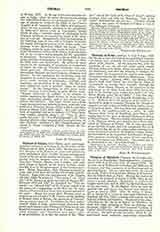

Thomas of Dover, martyr; d. 2 or August 5, 1295. On the above date the French ravaged Dover with fire and sword, and eventually attacked the Benedictine priory of St. Martin. All the inmates fled, with the exception of one, an old and infirm monk named Thomas Hales or de Halys, whom the sailors found in the dormitory, and slew for refusing to disclose the place where the treasures of the church were hidden. Numerous miracles [for which see Horstmann, “Nova legenda Anglial” (Oxford, 1901), and Bishop Challoner’s work cited below] are recorded by John of Tynemouth as having been wrought through his relics. Friar Simon Simeon, in the narrative of his pilgrimage to the Holy Land about 1322, bears witness to the honor paid to him as a martyr at “the Black Monks under Dover Castle” (“Itin. Sim. Simeon. et Will. de Wore.”, ed. Nasmith, Cambridge, 1778, p. 7). Richard II at the instance of his mother requested the pope to canonize Thomas; but though an enquiry was set on foot in 1382 nothing further seems to have been done. He was, however, popularly regarded in the neighborhood as a saint. In 1500 Thomas Rich, Vicar of Buckland, near Dover, left eightpence for the altar of Blessed Thomas de Halys at Dover Priory. His own church contained a chapel of St. Thomas, which may possibly have been dedicated to Thomas of Dover. He is very generally given the title of saint, and it is remarkable that he is represented (fig. 26) in the copper-plate reproduction of the pictures formerly at the English College, Rome, which resulted in the equivalent beatification of sixty-three martyrs mentioned by name therein (see English Confessors and Martyrs). On neither day is he mentioned in the “Acta Sanctorum”.
JOHN B. WAINEWRIGHT

